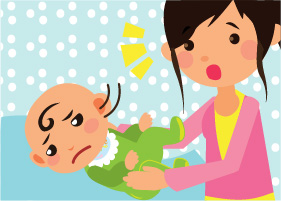The importance of good parent-child relationship
If you want your child to grow up to be independent and confident, act now! Having an intimate parent-child relationship starting from birth can give your baby a sense of security, which fosters his confidence and independence in the long run.
Why interacting with the baby important?
Interpersonal relationships are built through communications. If you have observed closely, you have likely found that he could communicate with others before he could express his needs in words, and developed an understanding of his cues such that you could respond to his needs accordingly. Through meeting your baby's physical needs, you are also fostering his sense of security and building a long-term and intimate parent-child relationship.
An intimate parent-child relationship can help your baby feel secure and being cared for. Your baby knows that you will be there to protect and console him whenever and wherever needed, giving him the confidence to venture out to explore the world. The experiences of being loved and courageous explorations will help your child grow up into an independent and competent person.
Research shows that responsive interactions with caregivers could facilitate brain development. Through constant communication and playing with your baby, the mutual trust and sense of security can be built, and you are laying the foundation for your baby's healthy development. For instance, you may talk about things your baby is looking at, such as naming what or who they are, or describing what the people are doing, like “a boy is running in the playground”. Even though your baby may not understand your words, don't overlook the importance of spending quality time together and try to enjoy these interactions.
How to talk and play with your baby?
Learning about your baby's emotions
Even babies experience different emotions. When your baby is hungry, he will be distressed and cry; when someone plays with him, he will be happy and may coo or smile; when he is tired, he will get grumpy. As your baby has very brief attention span, when you talk to him, he may lose interest very soon, turning his head away and appearing to be irritated. This means that he needs some quiet time, you can stop for a while and let your baby take a rest.
Babies sometimes cry out of loneliness. Give your baby more attention when he is calm by touching, rocking or talking to him. You can also play him some soft music and show him interesting things. In doing so, your baby will feel contented and learns that he will get your attention when he is calm, thus reducing your baby's crying.

Ways to communicate with your baby
Playing with your baby can stimulate his development in various aspects. The best ‘toy' for your baby is YOU! Try to spend more time to play and interact with your baby, it helps to strengthen your parent-child relationship.
To communicate with your baby face-to-face, you can hold him in your arms or lie him down. You may watch the video here to learn more about the tips on communicating with babies.
Connecting with your baby ( 1 to 4 Months ) – English
Narrator: Connecting with your baby now, helps building a close relationship between the two of you.
Sub-heading: Stay face-to-face with eye contact
Narrator: Place your baby in such a way that you can look at each other face-to-face and maintain good eye contact at the same level. In this way, both of you can see the other's response well.
Sub-heading: Observe, then respond
Narrator: Observe your baby's reactions before you respond to her.
Sub-heading: Imitate your baby's sounds
Narrator: Try to imitate her cooing. Guess what she wants to say and respond accordingly.
Sub-heading: Talk with lively expressions
Narrator: Lively facial expressions can arouse your baby's interest.
Sub-heading: Add in toys
Narrator: You may make use of toys to attract your baby's attention.
Sub-heading: Take a break when your baby loses interest
Narrator: When your baby loses interest in what you say or do, you may try to use the above skills to attract her attention, or just let her take a break.
Apart from promoting babies' visual and hearing development, the above suggested activities can also stimulate their language development and enhance parent-child relationship. Yet, it is most important for you to enjoy interacting with your baby. Have interactions with your baby often for an intimate relationship between you and your baby later in life.

